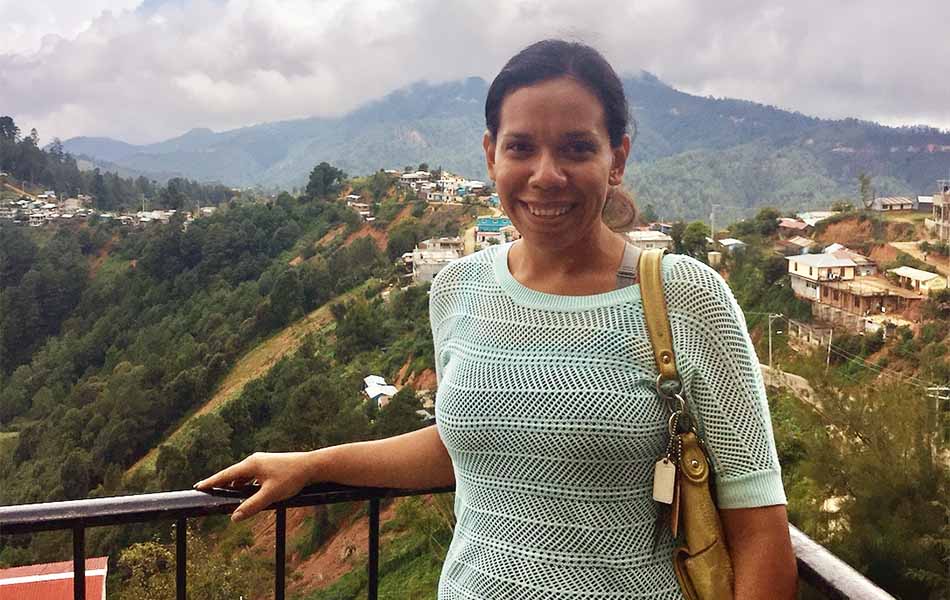Dr. Mónica Morales-Good conducting fieldwork in San Miguel Suchixtepec, Oaxaca
Imagine defending yourself in a courtroom using an unfamiliar language.
This is often the case for Indigenous speakers in Mexico and Latin America, but Language Sciences member Dr. Mónica Morales-Good’s research aims to change this. Morales-Good, a University of British Columbia Okanagan Faculty of Creative and Critical Studies Assistant Professor of Teaching, works to promote training programs for Indigenous language interpreters to indigenize the courtroom, and change ideas of ‘language superiority’.
Your scholarship examines ‘indigenizing the courtroom’. What does this involve and why is it important?
My research seeks to promote training programs for Indigenous language interpreters. It has been documented that in Mexico and Latin America, many Indigenous speakers are arrested and prosecuted without the help of qualified interpreters. In Mexico, qualified Indigenous language interpreters are scarce. Further, the State employees refuse to admit the need for language services and the worth of Indigenous language interpreters’ job.
Indigenous speakers are overrepresented in the Mexican jail system due to a language barrier.
Without an interpreter, Indigenous peoples struggle to present their ideas in a legal setting that favors Spanish over Indigenous languages.
To indigenize the courtroom, my research calls for better training programs for Indigenous language interpreters. My work also calls to recognize the work done by Indigenous authorities in the administration of justice.
How have linguistic factors played a role in barriers facing Indigenous communities presenting evidence in court rooms in Mexico?
When Indigenous language ideologies come in contact with Spanish ideologies, they come into a place of disadvantage because assumptions are made about what counts in a communicative event. Such assumptions tend to favor documents and images in the official language.
In Mexico, Spanish tends to be treated as the de facto language in the justice system. Indigenous defendants will admit proficiency in Spanish language to avoid mistreatment and racial issues, hoping that their case will move faster, but increasing the likelihood that they’ll be convicted.
This problem is rooted in language ideologies involving language supremacy, which play a crucial role in accounting for linguistic performance.
Language ideologies have an impact on the relationship between Indigenous defendants and the judge’s decision making; if Indigenous speakers admit to being fluent in Spanish, despite their limited command of the language, the public servants assume they have no problem communicating in the courtroom. This demonstrates the importance of the public servants’ ideologies in this context, since Indigenous speakers might be more likely to accept the help of an interpreter if their language ideologies didn’t result in discrimination toward indigeneity.
Your research also looks at Indigenous language reclamation and revitalization in Mexico – what does this involve?
Indigenous languages possess a strong relationship with culture, land, and, indeed, all aspects of life; therefore, Indigenous languages, knowledge, and practices cannot be separated from Indigenous identity and need to be considered throughout legal proceedings.
Indigenous interpreters stand between two worlds.
In this position, they can support Indigenous knowledge and create spaces for safe cultural interaction. Indigenous interpreters ensure that due process is being followed, and they ensure the Indigenous voice is being heard and not undermined, as has been the case for centuries. This, however, should not be the sole responsibility of the Indigenous interpreters. The State has to take action by creating policies that don’t limit Indigenous knowledges and justice systems — policies that reject cultural racism and linguistic discrimination, honoring the Indigenous perspectives not only on paper, but also in practice.
If we somehow manage to defeat the concept of language superiority, Indigenous people will be a step closer to decolonization and self-determination. This should be a collective effort between the State and Indigenous communities.
It can no longer be one-directional; Indigenous people must control their knowledge and the way it is distributed.
They should also oversee and safeguard their customs, rules, and ancestral practices, and it should be they who dictate the way that knowledge is shared and disseminated for the benefit of the communities.
